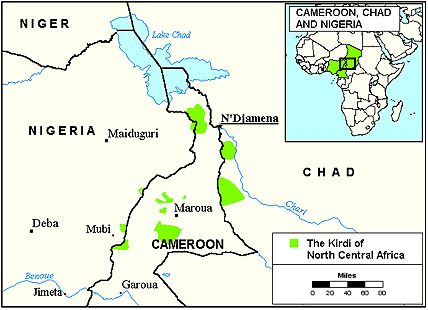Kirdi (meaning "pagan") is a broad, collective name for a number of people groups living in northern Cameroon, southeastern Nigeria, and southwestern Chad. At one time, all of these groups were completely pagan. Today, some have converted to Islam and wear traditional Islamic dress. That includes the Uzam, or Wuzlam people. Like many peoples, other culture groups define them by their language, Wuzlam.
The Wuzlam people stand out amongst others because they have been successful at maintaining a traditional lifestyle. They live in harsh conditions high up in the Mandara mountains at the summit and along its steep slopes. Most choose to farm, raising crops on hillside terraces. Their main crops include primarily millet, but also peanuts and maize, as well as melons, pumpkins and beans. Millet and other cereals usually grow on the mountains or hill slopes, while they raise other crops in gardens near their homes. They also harvest cotton, indigo (used for dyeing) and plants used for hunting, religious medicines and other purposes.
A Wuzlam man's work includes crafting leather, making baskets, spinning, weaving and building. Women make clay objects, train the small children, prepare the meals and do other household activities. A woman may also raise her own crops on a small plot of land. The profits earned from selling these crops belong to the woman. Children take care of the small animals and help their older siblings or parents do other household chores.
Traditionally, Wuzlam houses grouped together into small village settlements by clan or lineage. The villages clustered around mountain peaks that could not easily be accessed by outsiders. Mud-brick barriers that had been overgrown by thorn bushes protected them. Today, their villages contain several round buildings made of mud-brick and thatched roofs. The buildings connect to one another by woven straw fences or hedges, positioned to feature an open area in the center. Each home has a kitchen, an attic and a room for the husband; the wife lives in a separate hut. They add separate rooms to the house when the children reach puberty. Young males receive their own square huts, where they live until they are married.
Although the Wuzlam permit polygamy, most men usually have only one wife. Parents almost always arrange marriages; children do not choose their own mates. When parents make an agreement, the bride's parents pay a bride price, and the newlyweds begin a new homestead.
Wuzlam culture contains various arts, such as vocal and instrumental music. Their main musical instruments include whistles, flutes, horns, harps and drums. They play these instruments during festivals and at special ceremonies.
Each Wuzlam clan has its own "therapist-diviner" or medicine man. He benefits the community by supplying various medicines. He also serves as a mediator between the people and the spirits and performs minor surgical operations. Villagers pay the medicine man with modest gifts.
Although three of the Kirdi groups (the Wuzlam, Fali and the Mousgouma) have partially converted to Islam, most of the groups still follow their traditional ethnic religions.
They believe that the Earth is the "mother goddess" who has birthed all other "supernatural" beings, including thunder and lightning, black snakes, crocodiles, and certain inanimate objects.
The Wuzlam people can use more schools, medical clinics and hospitals in their homeland.
Ask the Holy Spirit to supernaturally reveal Jesus as the way, the truth and the life to the Wuzlam people.
Ask God to open their eyes, hearts and ears to the good news of the savior.
Pray for the Lord to raise up the right people to disciple the Wuzlams in His ways.
Pray for the Lord to demonstrate His power and goodness among them in a way they will understand.
Ask for an intervention of the Holy Spirit in each of their families.
Scripture Prayers for the Wuzlam, Uzam in Cameroon.
https://en.wikipedia.org/wiki/Wuzlam_language
https://pangloss.cnrs.fr/corpus/Ouldeme?lang=en&seeMore=true
| Profile Source: Joshua Project |











